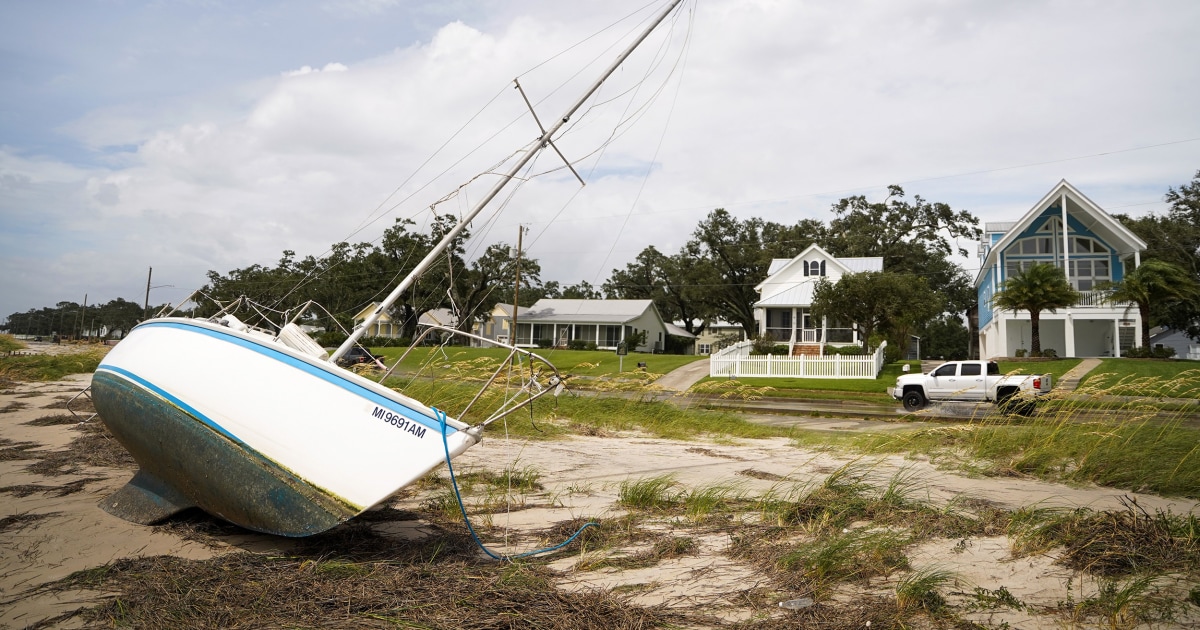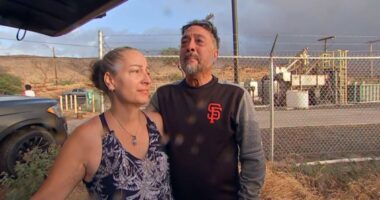
JACKSON, Miss. — Sixteen years ago, Laronne Lewis’ home in Waveland on the Mississippi Gulf Coast was leveled by Hurricane Katrina, which slammed the community head-on.
“I had to move away for seven years to rebuild,” he said.
As he drove back to his rebuilt home Monday, after having spent the night elsewhere with family, he was nervous.
“I’m a single dad, and I have three boys,” he said. “It was an experience for them to come back home to nothing. I didn’t want to tell them again. They’re older and grown men, but I didn’t want to have to tell them I lost the home again.”
He was thankful to discover that Hurricane Ida, which made landfall in neighboring Louisiana on Sunday as a Category 4 storm, had left his home largely untouched.
The relief was felt across Mississippi as daybreak brought a clearer picture of the damage ushered in by battering winds and the drumbeat of heavy rain that blanketed the Mississippi Gulf Coast and surrounding pockets of the state. Officials and residents agreed that the state was scarred but that it had evaded widespread devastation as Ida moved through Monday as a weakened but still threatening tropical storm.
Gov. Tate Reeves said at a news conference Monday evening that initial damage reports from eight of the state’s 82 counties were “relatively light, considering the magnitude of the storm.”
Reeves said some federal staff members dedicated to Mississippi could be freed up to go to Louisiana, where residents of some of the hardest-hit areas escaped to their roofs to evade rising floodwaters.
“While the winds have died down a bit, it is still a dangerous storm,” Reeves said, warning that the state would get “a significant amount of rainfall” as Ida pushed northeast at 8 mph.
The storm is expected to enter neighboring Tennessee by early Tuesday.
Nearly 86,000 customers in Mississippi were without power Monday evening. Many residents continued to hunker down, and a number of schools across central and southern areas of the state remained closed. Uprooted trees and limbs showered some rooftops and yards in neighborhoods across southern Mississippi. The path of the damage wound hundreds of miles to central Mississippi, where the Brandon Police Department reported blocked roads due in part to downed power lines just outside Jackson, the state capital.
At least five hospitals and four nursing homes and a number of other assisted care facilities were operating solely or partly off of generators, said Jim Craig, an official with the state Health Department.
Reeves said emergency responders in Hancock, Harrison and Jackson counties launched 20 water rescues over the previous 36 hours. While no deaths have been attributed to Ida’s landfall in Mississippi, Reeves said a person died in a traffic accident on Interstate 10 in Harrison County while reportedly out to pick up sandbags before the storm arrived.
Residents in low-lying areas of Hancock County were particularly vulnerable to a storm surge that exceeded 8 feet.
In the coming days, Lewis, who lives in the county, will pitch in with a mutual aid effort to help neighbors. The effort is coordinated by the Mississippi Rising Coalition, a social justice group that addresses food insecurity and advocates for police accountability; Lewis is a board member.
Lea Campbell, president of the coalition, said organizers have a 20-foot truck stocked with supplies that can be distributed along the Pine Belt in southeastern Mississippi, on the state’s Gulf Coast and possibly into neighboring Louisiana.
Campbell, who lives in Ocean Springs, fought off sleep well into early Monday. A bayou is near her home, and she worried that a high tide expected before 4 a.m. Monday could bring floodwaters to her front door.
“I knew it was going to be a long night,” she said. “I was really relieved today the house didn’t take on water.”
But she is aware that not everyone escaped with near-misses. Campbell was busy Monday scanning messages flagging hard-hit communities and thinking about how to triage the needs.
In Hattiesburg, Frederick Chestnut took in his brother for the night amid fears that the deluge would make roads in his brother’s neighborhood impassable at best or that water would creep into the homes at worst.
Chestnut, a construction worker, ventured out before 7 a.m. after he got messages on social media asking for help. Chestnut said he and three other men helped move furniture out of a home where a tree had clipped part of the roof, exposing it to the rain. He will stay alert for others who may ask for help from the Mississippi Rapid Response Coalition, a partnership of several activist groups, including the Mississippi Poor People’s Campaign.
By early afternoon Monday, Chestnut and his brother were still uncertain whether the latter’s home had been flooded. When they tried to check earlier, a blocked road forced them to turn away.
“I’m heading over there now,” Chestnut said. “The water is still high.”
Source: | This article originally belongs to Nbcnews.com









